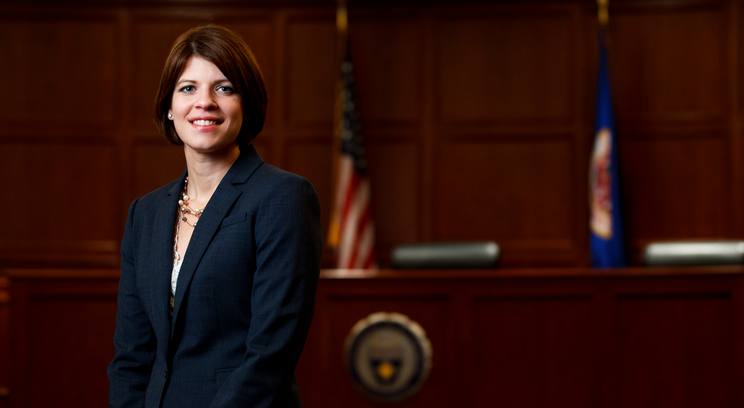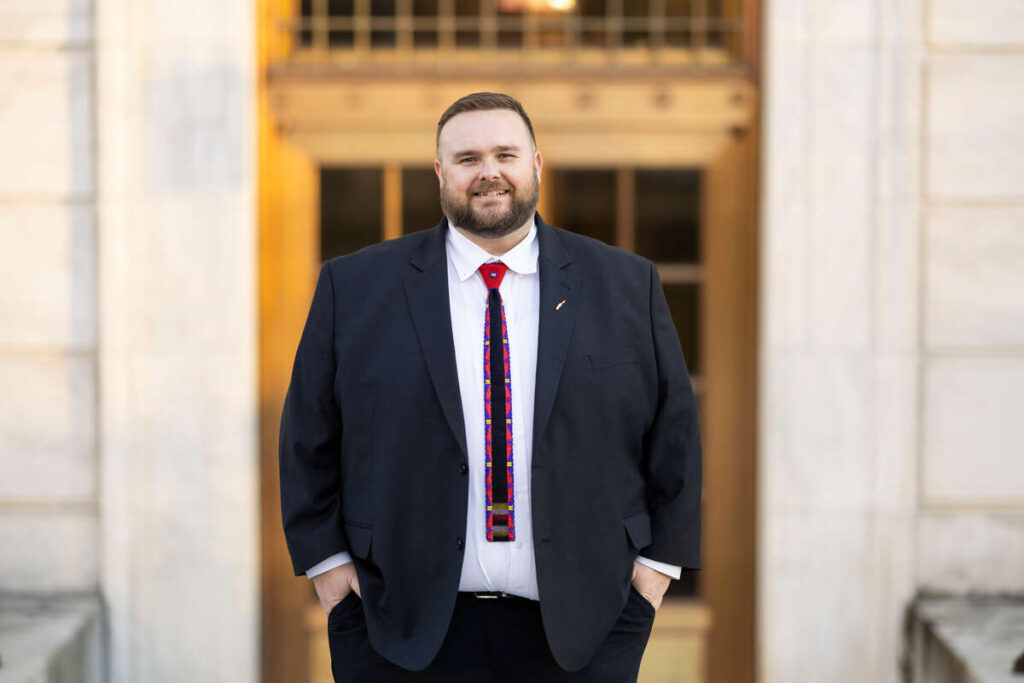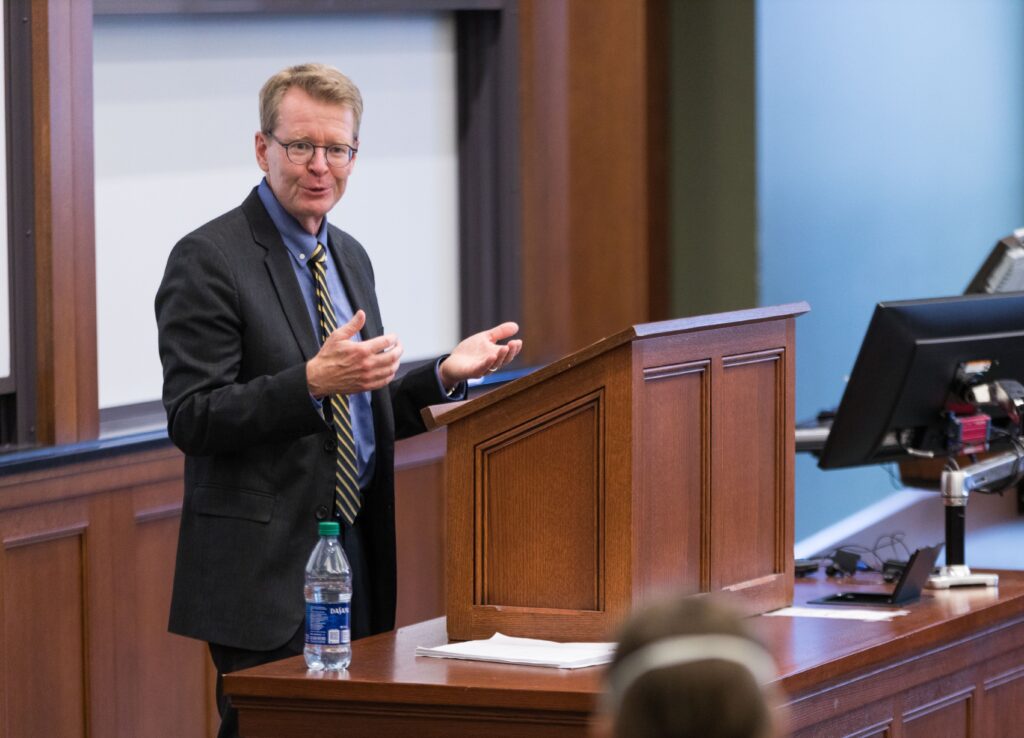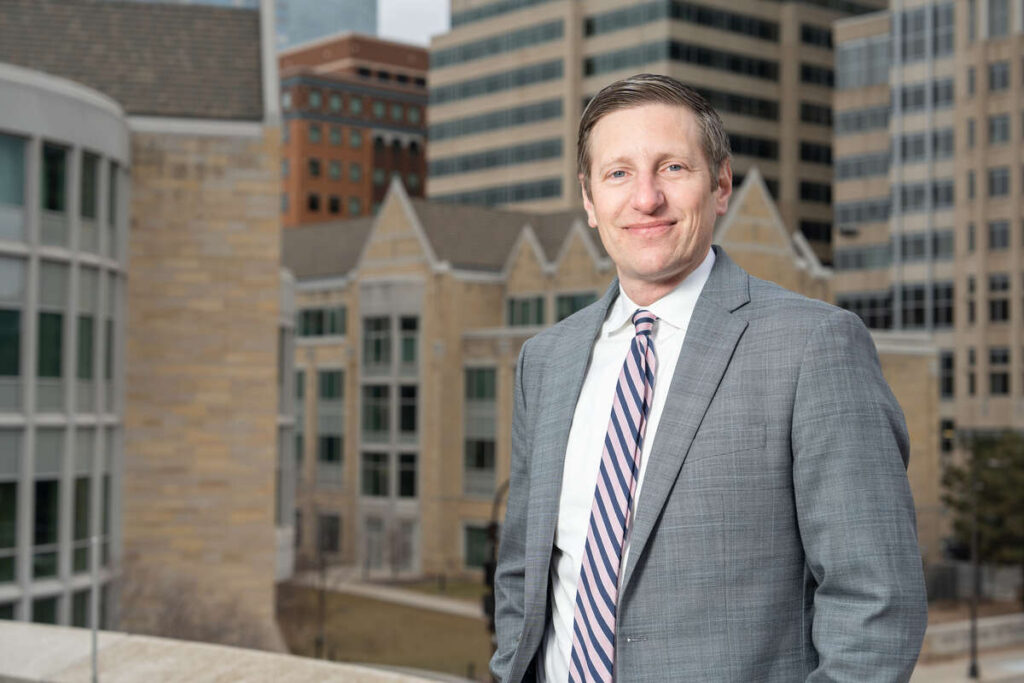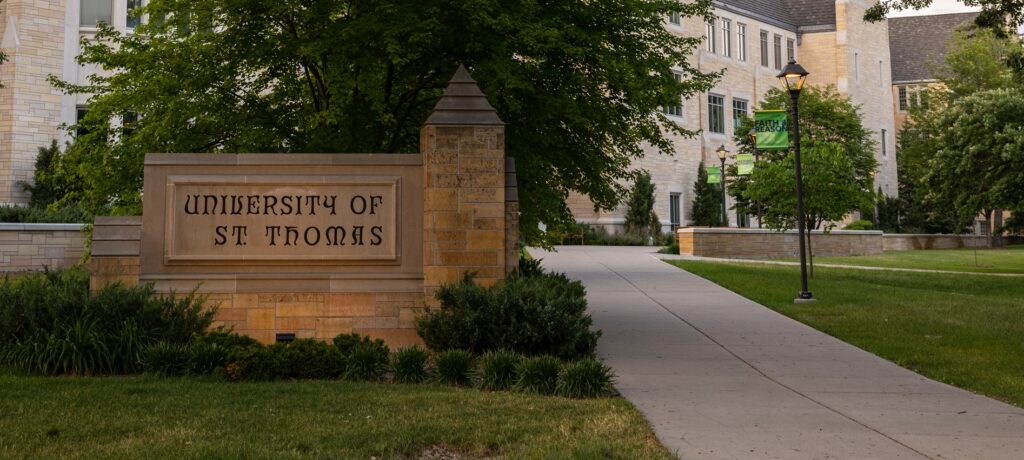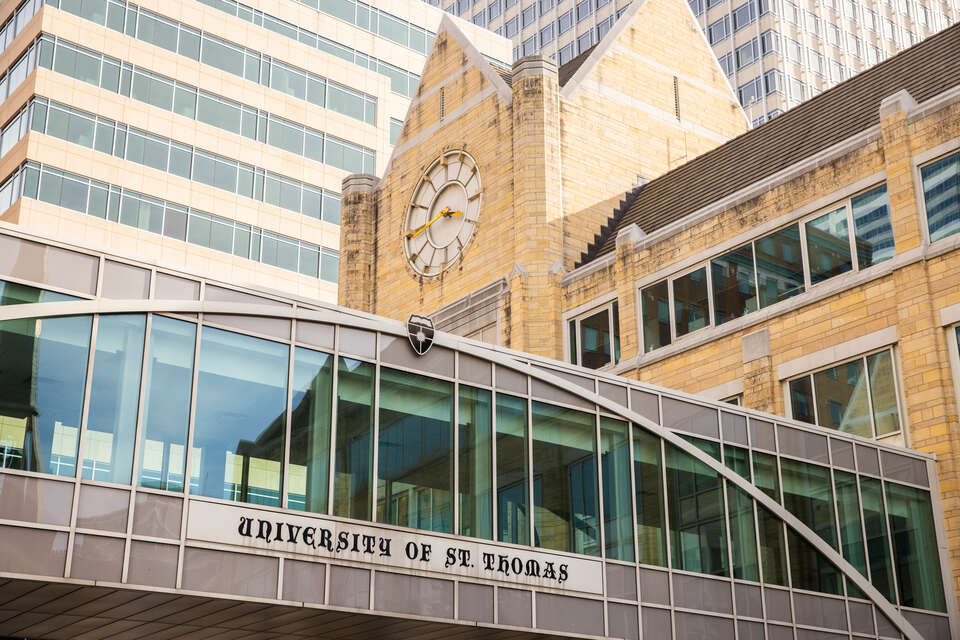On Nov. 7, the day after the election, the nation was divided again into red states and blue states. By Nov. 8 the debate started again about purple – places where the pundits said the results were too close to call, an anomaly, or they simply weren’t able to explain. The University of St. Thomas School of Law is one of those places that embraces the nuance and complexity of purple. Members of the law school community who are on opposite sides of controversial issues can disagree without being disagreeable, learning from each other and enriching our political culture in the process.
When the presidential election was in full swing and political tempers were flaring, a new student organization at the University of St. Thomas School of Law was formed to resist the partisanship and vitriol. The Public Discourse group focuses on quite the opposite: open, nonpartisan debate about how public policy issues intersect with law.
“Public Discourse was created to give people from a variety of political and philosophical perspectives an opportunity to dialogue,” said David Best, 2L, president of the organization. The idea for Public Discourse began when several first-year students formed a study group. “[W]e often digressed into policy discussions, but we also managed to usually keep it civil,” Best remembered. Several group members wanted even more discussion; hence, the Public Discourse group was born.
“One of the things that makes us unique is that, while all the members of the group have political preferences, the group itself is committed to being nonpartisan,” Best said. Although most public policy discussions inevitably involve politics, the group does not advocate a certain stance on issues. Its sole purpose is to talk.
“Society in general is too singular and partisan in its fact finding. When we can’t even agree on the facts, it hinders the quality of the discussion, and in the political context, the quality of resulting legislation and public policy,” Best said.
He believes the group’s mission – to provide a healthy discussion forum – will blend well with the overall environment at UST Law. “I have been impressed with the bipartisan nature of the school’s atmosphere. Certain individuals certainly have opinions, but by and large it has been positive,” Best said.
But while the UST environment welcomes discussion, Best sees an opportunity to strengthen the quality of dialogue on campus. “There are a good variety of guest speakers on all imaginable topics. But there is often little time for questions during or following the events,” he explained. Therefore, the Public Discourse group will sponsor several events throughout the year that facilitate conversations between speakers and audiences and allow ample question time. In theory, active discussion and debate should curb purely partisan presentations.
The group’s first event on Oct. 30 focused on how to effectively conduct public discourse. It featured UST Law professors Mark Osler and Teresa Collett, two colleagues who have publicly advocated different sides of the marriage amendment. Nonetheless, they often seek each other’s opinion and exemplify the art of “doing public discourse well.”
Last fall was incredibly busy for Osler and Collett. Both taught classes as well as lent their time as independent advocates for some of the most talked-about public policy issues of the day – all at the height of the 2012 election cycle.
Osler traveled to California to bring his well-known “Trial of Jesus” seminar to two universities while the state’s residents prepared to vote on a ballot provision that would repeal California’s death-penalty law. The seminar, which Osler has performed at various universities around the country over the last several years, takes a closer look at whether Biblical principles on the sanctity of human life comport with federal and state capital punishment laws.
Collett worked throughout the summer and fall, speaking to several churches and organizations across Minnesota to advocate for passage of the state constitutional marriage amendment. A well-known expert on the subject of marriage law, Collett has penned several opinion articles on the issue for various local and national publications.
Osler joined in the public conversation about the marriage amendment, although he had decidedly come down on the other side of the debate. One year ago, the pair wrote corresponding opinion pieces on the marriage amendment, which were published in the Minneapolis Star Tribune. From that point on they have discussed the topic with each other quite regularly.
Maybe it is pure coincidence that Collett and Osler, whose offices are next door to one another, each spent considerable time teaching at law schools in southern Texas before they landed at UST Law. And maybe it is also coincidence that both are well-regarded advocates for some of the highly publicized social and public policy issues of our day. But they agree it is no coincidence that their working relationship has established a mutual sense of respect for each other’s opinions – although sometimes diverging – on a range of hot-button issues, including the marriage amendment. Both believe they are better informed individuals for engaging each other in such conversations, even amid an ever-increasing sense of political polarization among the electorate during one of the more contentious election cycles in recent memory.
“It’s been great to discuss all of these issues with Teresa because even though we may agree on one issue and disagree on another, we can have the same principled, respectful discussion throughout,” Osler said.
Collett echoed those sentiments. “Even the conversations we have over coffee or in the hallway on these issues are valuable conversations,” Collett said. “Because when I talk with Mark about such issues as the death penalty or marriage, I know I am encountering a person who is very smart, but who has also dedicated a lot of his intellectual time to thinking about the proper application and principles of justice in that context.
“We may agree on some things and disagree on others, but I think we both share that same common principle – that there are systems of communal governance and structure that are more suitable to the human person and that will create more genuine happiness – what the philosophers call ‘flourishing.’”
Although they may not always agree on how precisely to apply such principles in the context of particular laws and public policy issues, their continued dialogue provides a solid example of the atmosphere a Catholic law school such as St. Thomas strives for, said Robert Vischer, School of Law dean. “Professors Collett and Osler are both passionate, effective advocates who are wonderful models of how to disagree without being disagreeable,” Vischer said. “Inside and outside the classroom, we count on our faculty to lead the way in showing how the mission of our school can broaden and deepen conversations about law, politics and culture.”
While Collett has been at UST Law since 2003 and Osler joined the faculty more recently in 2010, both previously taught a decade or more at law schools in southern Texas before making their way north. Their impetus in trading a relatively year-round warm climate for one that includes an honest and true version of winter was of a similar vein.
Collett was a professor for 12 years at South Texas College of Law, a private, secular school in Houston, before she felt the call to serve the Catholic Church more directly in her capacity as a professor at a Catholic-affiliated institution.
Osler taught for 10 years at Baylor University School of Law, the largest Baptist post-secondary institution in the country. Although Osler is not Catholic, he is a practicing Christian and said he was drawn to UST Law because of his appreciation for the intellectual tradition of the Catholic Church’s integration of “faith and reason” in its search for truth on issues of morality and social justice.
“First and foremost, intellectual and scholastic life survived because of Catholicism for a long time,” Osler said. “And a part of intellectual life has always been that give and take, of ‘what does this mean?’ It’s great to have those conversations while being able to lean on an institution that has reasoned through those questions for many centuries.”
Collett said she was drawn to St. Thomas because of her belief that the ideal model for a Catholic law school is one that provides a framework for discussion of the application of the Church’s well-reasoned doctrines as they relate to the intersection with cultural norms and law. She said she values the Catholic principle of room for debate, but not for the sake of debate itself.
“When everything is subject to debate simply for the sake of debate, I am troubled by that idea,” she said. “For example, I don’t think the principle that we should strive toward ‘goodness’ is really subject to debate. Now exactly how do we get from here to there, how to achieve ‘goodness,’ in the context of our laws and public policy, that’s where the interesting conversation lies.”
The School of Law is a place that welcomes conversations, even uncomfortable ones, as a matter of civil discourse. Discussions of issues do not have to be separated into red and blue, as in politics. It takes both colors to form purple and it takes collaboration and consideration to inform an equitable discussion.
“To me this is what the ideal Catholic university does,” Collett said. “We collect people, many of whom have common first principles, but, who because of their own gifts and talents and circumstances of their lives may have focused on differing aspects of how to create a just legal order. And from those unique and valued perspectives, we can have some amazing conversations.”
Dean Vischer said the Catholic law school’s focus on the value of human dignity helps to foster fruitful dialogue even during an election season when the stakes of engaging in such conversations seemed so high. “As a Catholic law school, we are founded on a commitment to honor and respect the dignity of every person,” he said. “This provides a strong foundation for healthy and civil dialogue, even when we grapple with the most controversial issues of our day.”
Read more from St. Thomas Lawyer.

